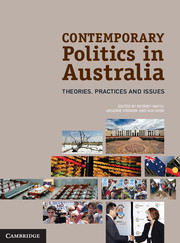Book contents
- Frontmatter
- Contents
- Tables and figures
- Contributors
- Acknowledgements
- Introduction
- I Contemporary Theories of Australian Politics
- Part II Politics in Everyday Australian Life
- Introduction to Part II
- 7 Political values and attitudes
- 8 Political socialisation
- 9 Media politics
- 10 Politics in Australian culture
- Part III Elections
- Part IV Participation and Representation
- Part V Inside the Australian State
- Part VI Contemporary Public Controversies
- Glossary
- References
- Index
Introduction to Part II
from Part II - Politics in Everyday Australian Life
Published online by Cambridge University Press: 05 June 2012
- Frontmatter
- Contents
- Tables and figures
- Contributors
- Acknowledgements
- Introduction
- I Contemporary Theories of Australian Politics
- Part II Politics in Everyday Australian Life
- Introduction to Part II
- 7 Political values and attitudes
- 8 Political socialisation
- 9 Media politics
- 10 Politics in Australian culture
- Part III Elections
- Part IV Participation and Representation
- Part V Inside the Australian State
- Part VI Contemporary Public Controversies
- Glossary
- References
- Index
Summary
Politics is often thought of as something engaged in by others – by the parliamentarians, Cabinet ministers, public servants and judges whose roles comprise the Australian state (see Part V), or perhaps more broadly by leaders of party organisations and pressure groups, lobbyists, pollsters and others who have direct daily contact with figures in formal positions within the state (see Part IV). Moreover, what we know about politics is brought to us by news media organisations dominated by elite opinion leaders and run as large businesses or public sector agencies. Politics is by and about them, not by and about us.
The view that politics is what a special group of others do has already been challenged by a number of the theories discussed in Part I of this book. Democratic theory ultimately rests on the idea that government responds to the views of the populace (Chapter 1). Behaviouralism stresses the connections between actors in the political system and the wider social system in which ordinary people participate (Chapter 3). Critical theories of politics, highlighting the unequal power relationships of class and gender, identify the sources of these inequalities in everyday sites such as workplaces and families (see Chapter 4). Post-structuralism points to the dispersed nature of power throughout societies (Chapter 5). The relationships between domestic and international politics outlined in Chapter 6 suggest an interconnectedness between the power relations found throughout societies and the power exercised between states and other international actors.
- Type
- Chapter
- Information
- Contemporary Politics in AustraliaTheories, Practices and Issues, pp. 70 - 71Publisher: Cambridge University PressPrint publication year: 2012

